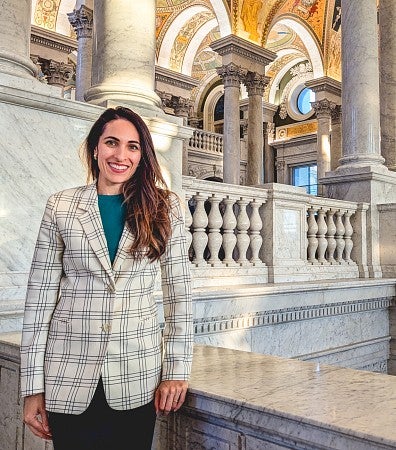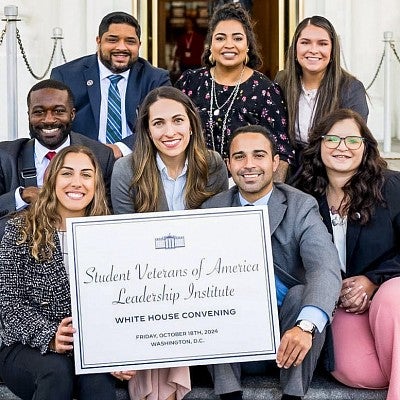
Priya Sage charts her own course. Whether that means rescuing people off the coast of Maine as part of the U.S. Coast Guard, pursuing double master’s degrees — one in strategic communication (STC) and the other in immersive media communication (IMC) -– or revitalizing a Student Veterans of America chapter at the UO, she loves chasing a goal.
And all her routes lead in the same direction — toward a career in communication.
Sage served three years in the Coast Guard as a petty officer third class, primarily in search and rescue and marine environmental protection in downeast Maine and in Alaska’s Bering Sea. From there, she moved to Italy, where she earned her undergraduate degree in communication and media studies before moving back to the United States to attend the University of Oregon.
She was initially attracted to the Strategic Communication Master’s program because, she said, it offered the perfect blend of a professional master’s with academic components, and the hybrid format was exactly what she was looking for.
But then she learned about the Immersive Media Communication Master’s, and she knew she wanted to pursue that as well.
“I moved back to the U.S. because of this program,” Sage said. “The Immersive Media Communication Master’s is one of the first programs of its kind. The University of Oregon is doing cutting-edge research at the forefront of the immersive media industry.”
Helping other student veterans
Sage initially found the transition from military service to student veteran was not always easy.
“Student veterans represent an incredibly diverse group in higher education, with most being considered nontraditional, myself included,” she said. “When I transitioned out of the military, I felt directionless. The skills I was trained in did not translate well to what I was passionate about. That’s why I’m so grateful to have the opportunity to go back to school.”
After realizing just how many resources are out there to help student veterans, she began to work with Peer Advisors for Veteran Education (PAVE), a peer-to-peer support program across campuses in the U.S. that connects incoming student veterans with student veterans to help them navigate college life. Sage now shares the resources that she’s found most helpful in her transition while also offering a listening ear when times are hard.

“In the military, we're conditioned to execute orders and accomplish the mission — no questions asked,” Sage said. “But transitioning to civilian life, especially college, flips that mindset on its head. You need to speak up, ask questions and seek help. When student veterans connect with similar peers on campus, they’re more likely to succeed.”
Sage subsequently learned about an organization called Student Veterans of America (SVA), a nonprofit that advocates on behalf of thousands of student veterans. SVA has branches at more than 1,600 schools. But there wasn’t an active branch at the UO, so working with the Veterans and Family Student Association (VFSA), Sage made the case for having an active chapter.
Recently, Sage was chosen to attend the SVA Leadership Institute in Washington, D.C. There she networked with other student veterans, developed her leadership skills and had the opportunity to speak with a panel of White House staff members and senior officials about issues affecting student veterans.
As a skilled communicator, attending the conference was right up her alley. Communication is a passion of hers, and, in fact, it was the communication emphasis of both the STC and IMC master’s programs that appealed to her.
Investigating the implications of AI in the workplace
In the STC program, Sage is delving into the organizational implications of artificial intelligence (AI). For her terminal project, she’s writing a thesis on the intersection of AI and corporate leadership. Through her research, Sage found that many companies do not have policies on the use of AI in the workplace so she decided it was an issue she wanted to take on.
“There are ethical implications if you’re not teaching your employees how to use such a widespread tool,” Sage said. “There is also a lot of research showing that employees will bring their own AI to the workplace even if it’s banned, presenting not only an ethical and legal risk, but also a security risk within a company.”
One of her favorite classes at the SOJC was Strategic Influence, taught by Melissa Havel, a member of the STC’s Strategic Communication Leadership Network (SCLN). The SCLN includes some of the top communication leaders in the world — executives from companies like Microsoft, Nike, WE Communications and Edelman Public Relations. In fact, the network was another important reason she chose to attend the UO.
“It’s a really amazing opportunity to learn from people who are considered to be leaders in the field of communication,” Sage said. “They are also directly influencing what we are learning in the program. I know that what I’m studying is relevant to industry work and not just theoretical.”

Exploring immersive communication formats
It was the IMC program that piqued her interest in emerging technologies and led her to join Snap AR scholars, a student-led creative agency using augmented reality (AR) storytelling to empower organizations to create positive social impacts.
As a SnapAR scholar, Sage is on the research team working to bring awareness to Oregon marine reserves through the use of immersive technology. That project involves working in the Oregon Reality Lab, a multidisciplinary teaching and research facility on the UO Portland campus dedicated to cultivating immersive media as an ethical tool for communication innovation.
She is now part of a mixed-methods research team that is exploring what design and structural elements encourage users to engage in prosocial ways in virtual worlds, specifically the game Horizon Worlds. The team is led by Daniel Pimentel, assistant professor of immersive media psychology.
“Priya’s leadership, creativity and professionalism are invaluable assets to the work happening at the Oregon Reality Lab,” Pimentel said. “She has led a research project with a major industry partner, submitted a research paper to the International Communication Association Annual Conference, and is assisting with research and design efforts in the lab as well. Overall, I consider her to be a star in the SOJC.”
Within the IMC program, Sage says she leans into research, design and applied work. But the strategic communication program offers different opportunities.
“Strategic communication is more of a professional master’s,” she said. “They teach skills that you can bring back to your company to empower you to do better at the job you are already doing.”
What type of job would Sage like when she graduates?
“I'm less focused on finding a specific title and more interested in opportunities where I can drive real organizational growth,” Sage said. “My ideal role would leverage my strengths in communication and research to solve complex problems. Whether that’s in corporate strategy, internal communication or public policy — what matters is the ability to create meaningful impact.”
–By Jennifer Snelling
Jennifer Snelling is a Eugene-based education journalist. She graduated from the SOJC with a master’s degree in journalism in 2001.
